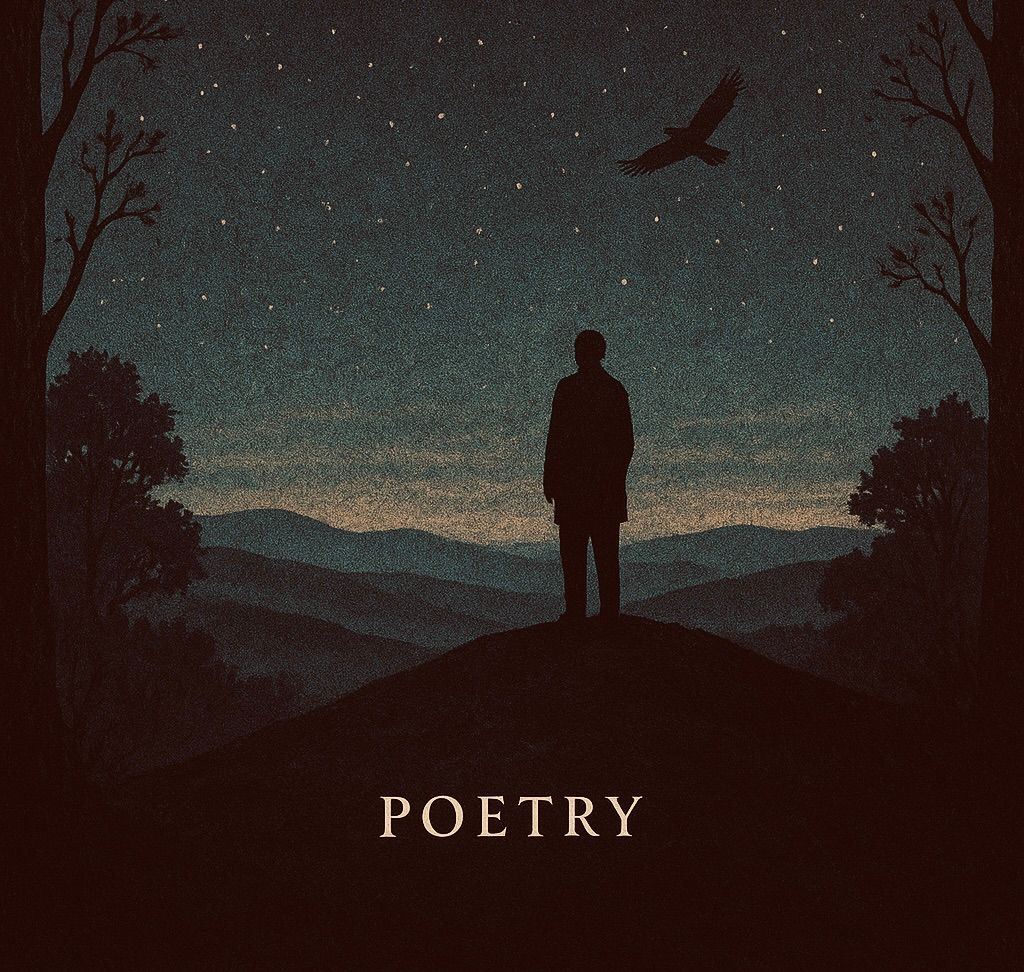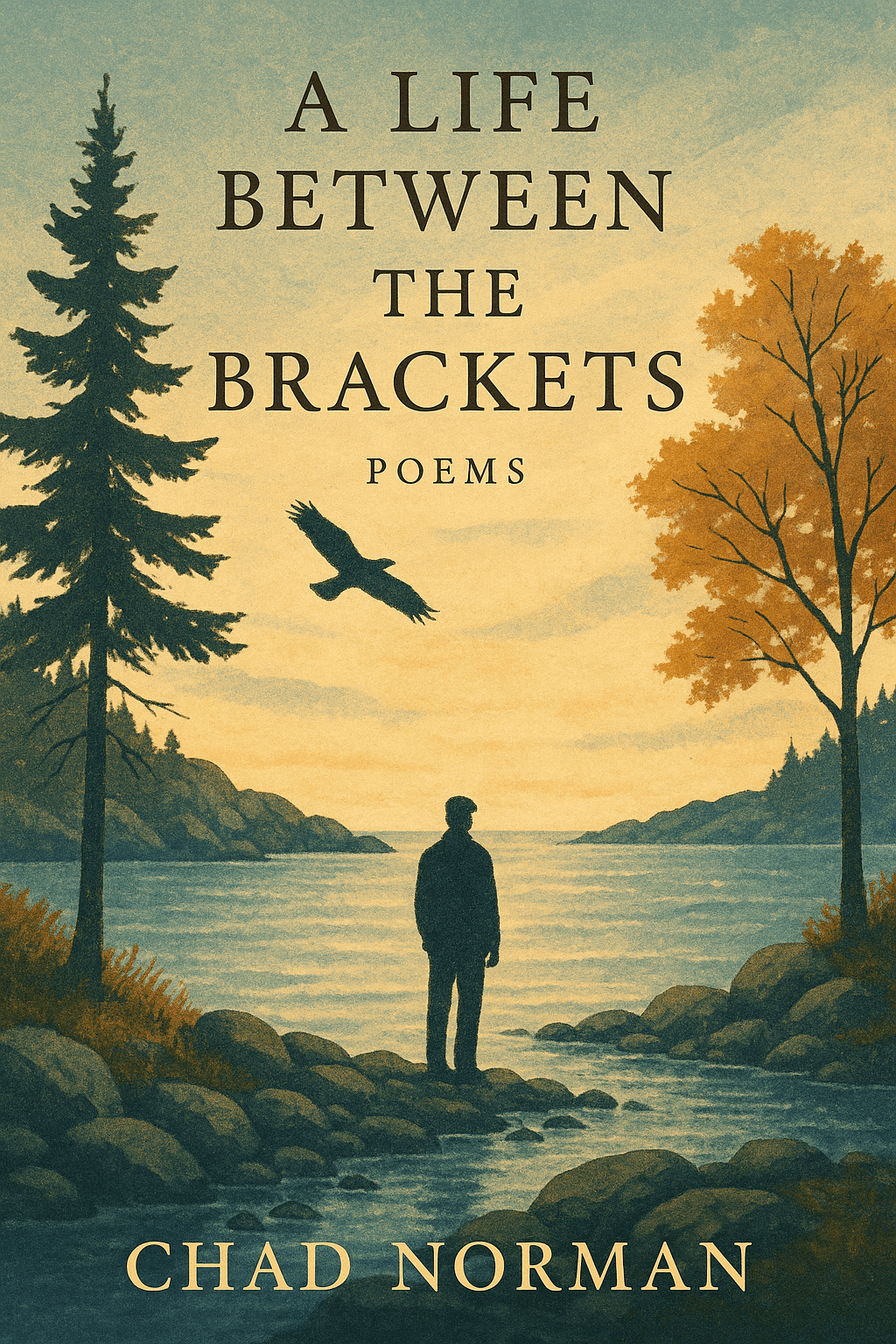'A Life Between The Brackets' by Chad Norman
CM
'A Life Between The Brackets' by Chad Norman

Thematic Synthesis and Key Insights
The forthcoming poetry collection 'A Life Between The Brackets' by Canadian poet, Chad Norman, serves as an eloquent and incisive witness to the modern world, meticulously balancing observations of the natural world with critiques of human-engendered crises. The poems explore the profound connections between humanity and nature while simultaneously confronting ecological destruction, social injustice, and economic hardship.
Central themes include the survival and wisdom of the natural world, the violent and often thoughtless impact of human activity, and the search for peace and meaning amidst personal and global turmoil. The collection is characterised by a deep sense of place, rooted in Truro, Nova Scotia, but extends its commentary to global issues such as the war in Ukraine and the legacy of colonialism in Canada. As summarised by Irish Poet, John Ennis, the work chronicles a world of both immense natural beauty and stark human failure, where "poems of survival balance ecological and man-engendered deaths" and where, despite significant loss, there is still "a happiness / in the songs / of the day’s melting ice."
Overview of the Collection
'A Life Between The Brackets' is a collection of poems by Canadian poet Chad Norman, published by the Ireland-based ShadowScript Publications. The book is structured into eight distinct sections, each exploring a different facet of the collection's overarching themes.
Author: Chad Norman Publisher: ShadowScript Publications ISBN: 978-1-9191909-6-9

Structure
The collection is organised into the following eight thematic sections:
1. Wisdom: Poems focusing on observation, nature, and introspection.
2. Humans Otherwise: Narratives and reflections on human lives, family, and memory.
3. Ukraine: Poems directly responding to the war in Ukraine.
4. Observe The Observer: Meta-reflections on poetry, relationships, and the act of seeing.
5. For Others: Dedicatory poems and reflections on specific individuals, communities, and events.
6. Industrial Ave.: Poems centered on the intersection of nature and industrial environments.
7. Religiously Brief: Short poems with spiritual or philosophical undertones.
8. Truro Town: Poems grounded in the author's local environment of Truro, Nova Scotia.

Core Thematic Analysis
The collection weaves together several powerful and recurring themes, creating a complex portrait of contemporary life.
1. The Natural World as Teacher and Witness
A predominant theme is the profound wisdom and intelligence found in the non-human world. The poet frequently positions himself as a student of nature, learning from animals, trees, and the changing seasons.
• Non-Human Teachers: In the acknowledgements, Norman explicitly thanks "teachers, for the most part those that are not human, sharing their intelligence and secrets about how to live this life." This sentiment is echoed in poems like "PROMISES TODAY, PROMISED," where the poet seeks entry into the woods to learn how birds "would show / I could be among them."
• Intimate Observation: The poems are filled with meticulous observations of animal behavior, celebrating the survival of individual creatures. Examples include a starling learning to feed itself ("THE PROVISIONS OF PERFECT TIMING"), the poet’s attempt to save an injured ant ("ACCIDENT AT THE MILL"), and gaining the trust of numerous birds and a chipmunk ("THE CLAPPING MAN'S CLAIM").
• Nature's Intrinsic Value: The collection champions the inherent worth of the natural world, separate from human utility. The return of honeybees is described as a "miracle" ("THE MEANING OF AMAZEMENT"), and the poet finds solace and connection in the forest, which has "many" chances, unlike a failing father ("WILFRED AND THE HARDWOODS").
2. Ecological Crisis and Human Negligence
Juxtaposed with the reverence for nature is a sharp critique of human impact on the environment, ranging from corporate destruction to individual thoughtlessness.
• Habitat Destruction: The multi-part poem "A PRESTIGIOUS HEADACHE, AND THE SIX-QUESTION CURE" is a direct and furious indictment of an ecologist, referred to as the "bird-lady," and a power corporation for the "butchery" and "decimation" of a young forest to solve the problem of "crows crapping on their trucks." The poem details the loss of habitat for foxes, deer, and mice, concluding that "Preservation has little to do with disregard."
• Pollution and Litter: In "CONFESSIONS OF A HOMEOWNER AND THE NEW LITTERS," the poet documents the proliferation of pandemic-related waste ("Mandatory Masks," "Gratis Gloves") and cannabis containers. He describes collecting over 70 masks from a schoolyard and seeing rubber gloves polluting drains, lamenting the carelessness of his "unintelligent / species."
• Climate Change and Natural Disasters: The poem "A TIME AND PLACE FOR EFF WORDS" addresses a series of disasters in Nova Scotia—Floods, Fires, and Hurricane Fiona—linking them to a larger pattern of environmental imbalance and questioning humanity's role: "I wonder if we know what's going up? / There's no question about what its coming back as."
3. Social and Political Commentary
The collection extends its critical lens to pressing social and political issues, grounding global events in local and personal experience.
• Violence and Hate Crimes: "THE FAIREST OF FARES" is a poignant memorial for Prabhjot Singh Katri, an immigrant Sikh taxi driver murdered in Truro in 2021. The poem decries the killing as "a crime committed with hate as a weapon" and recalls a personal, respectful encounter with the victim.
• Indigenous Reconciliation: The poem "JULY FIRST TWENTY-TWENTY-ONE" is dedicated to "the Indigenous children found and those yet to be." It reflects on the horror of the discovery of unmarked graves at residential schools, stating, "I know my country well / and today there is no doubt / it will be turned inside out."
• War and Peace: The "Ukraine" section directly confronts the Russian invasion. "THE RAPE OF UKRAINE" is a short, brutal poem, while "THE MORNING ACTIVIST" offers a starkly contrasting image of hope, dedicated to the mothers of Ukraine:
• Political Protest: "SAILING TO THE KREMLIN" is a tribute to Alexei Navalny after his death, casting him as the captain of a ship of opposition whose followers must continue the voyage. The poem repeats his name as a "nautical and symphony."
4. Economic Hardship and Labor
The poems also touch upon the precariousness of modern labor and the human cost of economic decisions.
• The Experience of Labor: In "THE NUT AND THE BOLT, 2021," the poet describes working a new job in an "endless warehouse," sweeping up "what's been left by the workers / who were told their jobs are over." He feels their losses in the "talkative air" and reflects on the shock of losing an income. The discovery of a single, unused nut prompts a meditation on lost potential and broken promises.
• Critique of Academia: The blurb by John Ennis notes the collection includes "a swipe at academia." This is most evident in "A PRESTIGIOUS HEADACHE," which critiques an ecologist whose education seemingly enabled, rather than prevented, environmental destruction for corporate convenience.
Author and Publication Details
About the Poet
Chad Norman lives and writes in Truro, Nova Scotia, Canada. His career includes the 1992 Gwendolyn MacEwen Memorial Award For Poetry, with judges Margaret Atwood, Barry Callaghan, and Al Purdy. His work appears internationally in various publications. A recent book, Parental Forest, was published in 2024. Notably, his poem "The Shoulds" was selected for the Lunar Vagabond Collection, part of a time capsule scheduled to be sent to the moon in November 2024.
- Conor MacGiolla Bhuí, October 2025. ©
*ShadowScript Publications is an independent publisher with offices in Galway City and Dublin, Ireland, launched in 2023 with a particular interest in poetry and short stories and a commitment to using paper sourced only from sustainable forestry and to diversity, inclusion and equality. Viva la forests!
